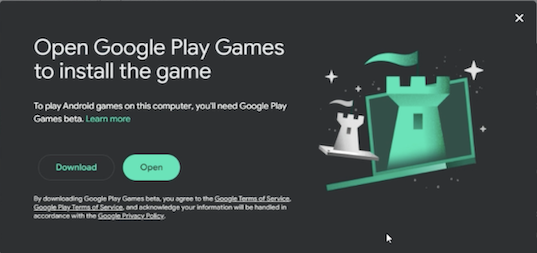Con Google Play Juegos para PC, los desarrolladores pueden ejecutar campañas de adquisición de usuarios (AU) de forma similar a como lo hacen hoy en día con los teléfonos Android móviles usando la biblioteca de referencia de instalación de Google Play y vinculando a la ficha de Google Play Store.
Situación de ejemplo:
El desarrollador genera una URL de Google Play, que incluye información de atribución de marketing y vínculos a la página de la ficha del juego en Google Play Store, y la usa en un anuncio en la Web o en un juego existente de GPG para PC. Tal vez se vería así:
https://play.google.com/store/apps/details?id=com.sample.package&referrer=utm_source%3Dsearch%26utm_medium%3Dcpc%26utm_campaign%3DsummerpromoEn este ejemplo,
utm_source%3Dsearch%26utm_medium%3Dcpc%26utm_campaign%3Dsummerpromocorresponde a la cadena creada por el desarrollador para la atribución de marketing y, tras la instalación del juego, se pasa a través del campo referrer al cliente del juego.Cuando un usuario de PC hace clic en un anuncio con este vínculo, se lo redirecciona a la página de la ficha del juego en la IU web de Google Play, que le brinda la opción de instalarlo en Windows.

Si se hace clic en Instalar en Windows, se le solicita al usuario que abra o descargue el cliente de Google Play Juegos para PC.

Si el usuario ya tiene instalado el cliente, al hacer clic en Abrir, se iniciará la página de detalles del juego en Google Play Juegos para PC y se iniciará automáticamente el proceso de instalación.
Si el usuario no tiene instalado Google Play Juegos para PC, al hacer clic en Descargar, se iniciará la descarga del instalador de la plataforma y, tras la instalación y configuración correctas de Google Play Juegos para PC, el juego comenzará a instalarse automáticamente.
Este es el mismo flujo, independientemente de si el usuario hace clic en el anuncio desde el navegador web o si se encuentra dentro de otro juego de GPG en PC. En el segundo caso, el cliente de Google Play Juegos para PC inicia un navegador con la página de la ficha del juego en la IU web de Google Play Store para iniciar el flujo de descarga.
Una vez que se instale y se inicie correctamente, el desarrollador puede recuperar los detalles del referente dentro del juego con la biblioteca de referencia de instalación de Google Play.

